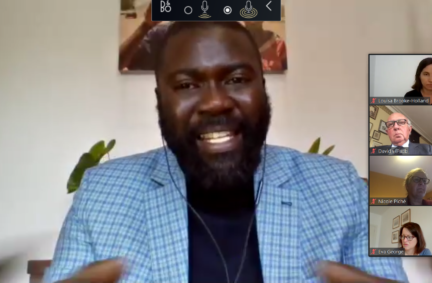

COVID-19 straining health systems in Africa which were already struggling to cope
BGIPU convened on 9 July a roundtable in collaboration with ICRC on “The Impact of COVID-19 on existing conflict areas in Africa”. On the panel were four very knowledgeable speakers: Mr Ben Fender OBE, HM Ambassador to Somalia; Ms Emily Maltman, HM Ambassador to DRC; Mr Rowan Laxton, HM High Commissioner to Cameroon; and Mamadou Sow, Head of Southern Africa for International Committee of the Red Cross (ICRC). The event was chaired by BGIPU Chair, Harriett Baldwin MP who also drew on her extensive experience as FCO/DFID Minister for Africa. Participating in the roundtable were not only MPs and Peers, but also Parliamentary staff and other BGIPU contacts with interest in the region. The roundtable was an opportunity to learn first-hand what the situation on the ground is like and how best the UK Parliament can support those in need.
It was clear from presentations that COVID-19 compounds and complicates existing threat for countries with weak security and fragile healthcare systems. It is yet another disease threatening people already at risk of measles, Ebola, cholera and malaria; an additional catalyst for fundamentalists, such as Al-Shabab, to promote their fundamentalist agenda; yet another setback to economic growth and prosperity. All four speakers gave in-depth analysis of the situation in their respective area of responsibility, providing valuable insights into the widespread repercussions of the pandemic which is affecting peoples’ lives and livelihoods.
Suffice to say, the humanitarian impact is grave in circumstances where weak healthcare facilities were already struggling due to the impacts of years of conflict. To give an example, in North Mali, 93% of health facilities have been destroyed due to fighting. In South Sudan, there is 1 physician for every 65,000 people. In Somalia, less than 15% of people in rural areas have access to health facilities. Furthermore, for the 27 million refugees and internally displaced people living in overcrowded camps across Africa, access to clean water and sanitary living conditions which are key to combating COVID-19 is practically non-existent.
In the lead-up to the event, BGIPU Chair Harriett Baldwin MP, outlined her own perspectives on the impacts of COVID-19 on conflict-affected regions of Africa in an article for The House highlighting that COVID-19 places extra strain on health systems in Africa which were already struggling to cope. She argued this underscores the vital importance of the donor community continuing to provide essential needs like healthcare, water and sanitation as well as improving education and building climate resilience in areas already afflicted by instability, violence and poor governance.
In summary, this virtual roundtable allowed MPs and Peers to learn directly from those on the ground about the grave nature of the situation and how COVID19 is compounding long-existing vulnerabilities and risks. This successful collaboration with ICRC complemented BGIPU’s work with the British diplomatic missions in the region and maximised what we could learn through bringing together these connections, even in a virtual format, for a very informative exchange.













